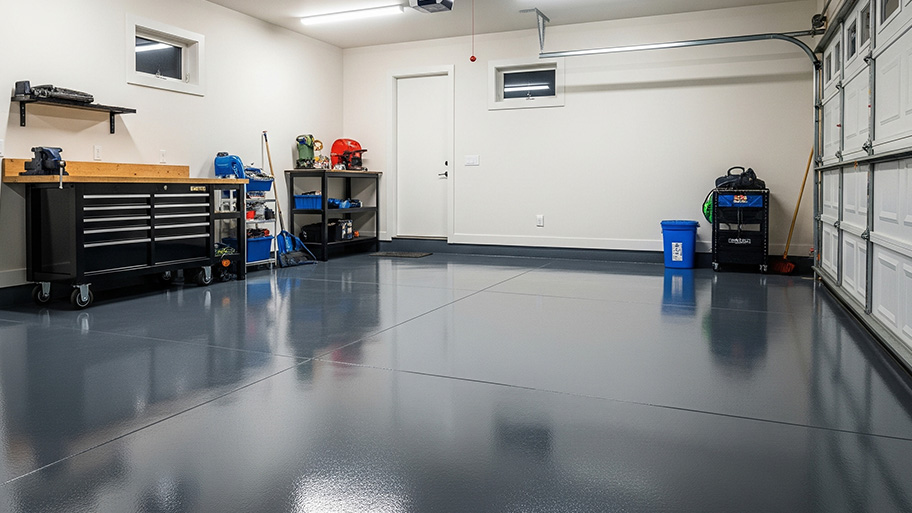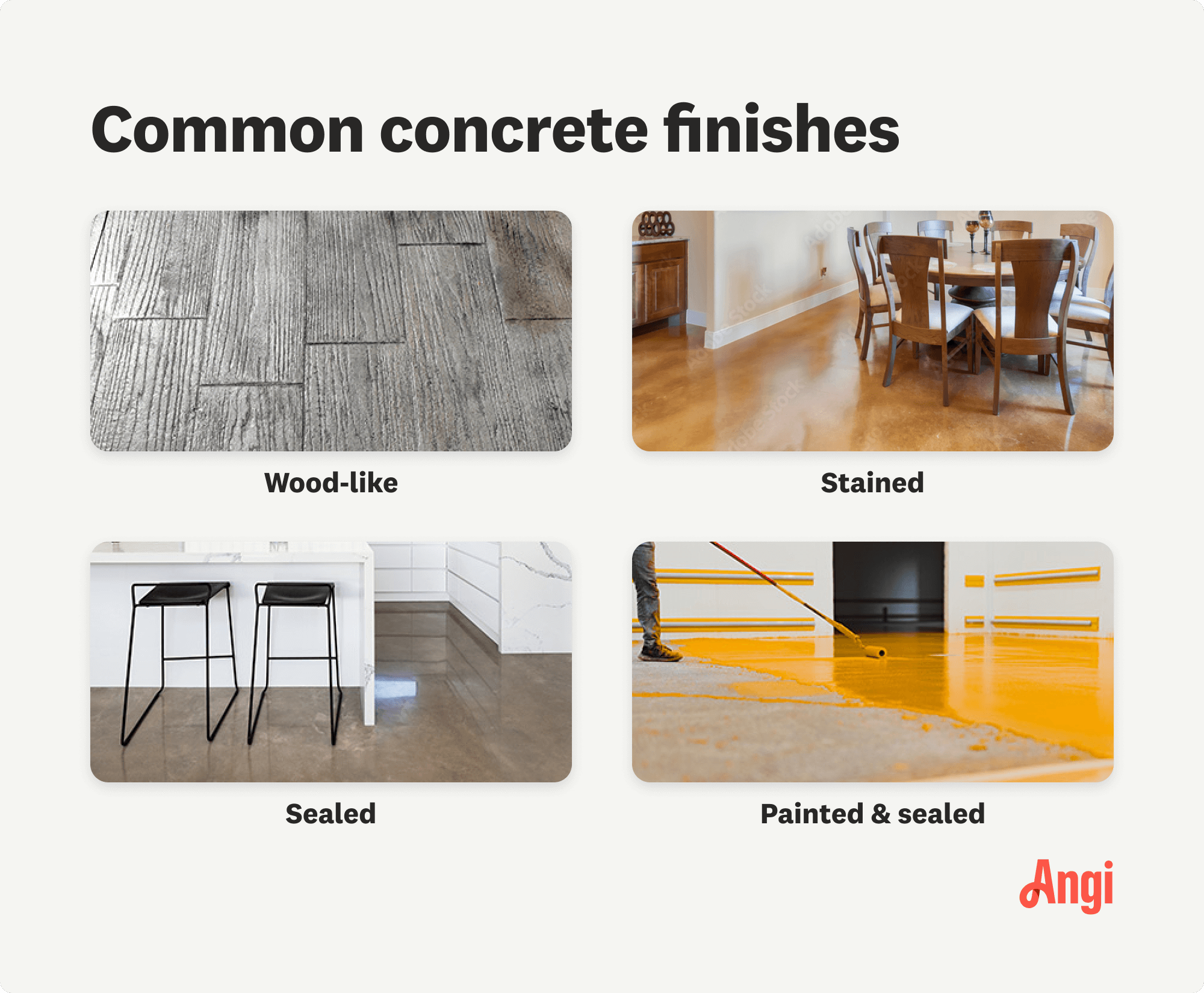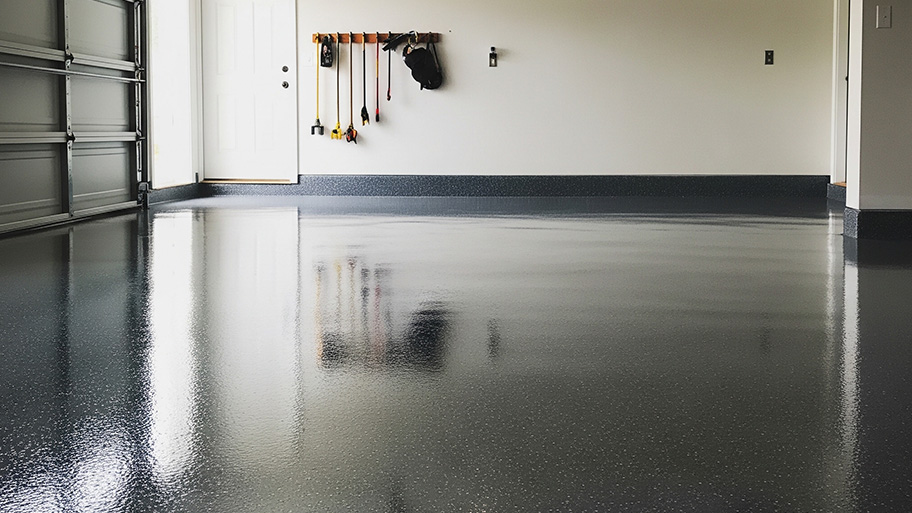
This guide breaks down the cost of installing epoxy flooring in your garage, basement, or other space. Costs depend on resin type, floor size, and more.
The average cost to replace a garage floor is $4,300, but the size of the garage and type of floor can lead to a variation in price. Most people pay between $2,400 and $11,200, but you can call a garage floor pro for a more accurate estimate based on your garage’s specifications.


Garage floor replacement costs from $2 to $14 per square foot, or about $3,000 to $7,000 for a standard two-car garage.
You can seal hairline cracks for under $250, but deep or spreading cracks may signal foundation trouble that drives costs more than $5,000.
Concrete with an epoxy coating runs $2 to $12 per square foot, while polished porcelain or glass tile can top $100.
Resurfacing the garage floor yourself might save up to $4 per square foot, but a small mistake can crack the slab and double the total bill.
Garage floor replacement costs $4,300 on average, but you could pay as little as $480 or as much as $18,100. It’s safe to say that the garage gets pretty heavy traffic—both foot traffic and literal traffic from your car. This can quickly lead to a cracked surface, which could be detrimental to the total foundation of your home. The cost to redo a garage floor encompasses a lot of different factors, and we’ve got them all lined up for you so that you can start budgeting.
The local cost of living will determine what you pay for labor, but there are a few other items that affect the final price of a garage floor replacement, including structural testing and repairs. Then you can get to the more fun decisions, like deciding if you want to stain or stamp your concrete.
Whatever your plans are, it’s essential to know the price tag of your project. Here’s a breakdown of garage floor replacement costs.
On average, the cost to replace a garage floor is $7 per square foot, but prices range from $2 to $14 per square foot. Flooring for one-car garages (roughly 240 square feet) costs $1,680, and flooring for two-car garages (roughly 440 square feet) costs $3,080.
| Garage Size | Square Feet | Average Cost |
|---|---|---|
| One-car garage | 240 | $480–$3,700 |
| Two-car garage | 400 to 484 | $800–$6,800 |
| Three-car garage | 864 to 1,296 | $1,700–$18,100 |
The cost to replace a garage floor will depend on what parts of the job you tackle yourself. Doing minor repairs and recoating can save you $3 to $4 per square foot if you’re confident in your DIY abilities. However, if you make a mistake DIYing it, you’ll pay double the price, plus a couple of wasted afternoons.
Keep in mind that installing a new floor in your garage can also mean that you’ll need a garage door replacement if the new floor is too high. If your garage door won’t close after replacing the floor, you’ll need to start budgeting for a replacement.

Don’t feel like you’re stuck with the same concrete flooring that’s been there since you bought the home. While concrete flooring is the standard, you can always put different flooring over it if you want to change the purpose of the garage.
The price depends on the type of flooring material and size. For example, glass tile costs much more than carpet or vinyl. Here’s the average cost of garage floor replacement per square foot for each type of material:
| Flooring Material | Average Cost Per Square Foot |
|---|---|
| Concrete with epoxy | $2–$12 |
| Vinyl flooring | $2–$7 |
| Carpet | $3–$5 |
| Rubber | $1–$2 |
| Ceramic tile | $4–$8 |
| Porcelain tile | $2–$15 |
| Porcelain wood tile | $3–$12 |
| Rectified tile | $6–$8 |
| Slate | $4–$10 |
| Glass | $10–$180 |
Since the garage floor is often a part of the concrete foundation of the home, you’re likely going to need to call out a structural engineer to verify that there are no structural issues. You might also be required to have a geotechnical engineer come out to test the soil to make sure the land is still suitable to build on.
Common prices for evaluations include:
The cost to hire a structural engineer: $550 for a single report
The cost to hire a geotechnical engineer: $1,500 for a single report
In the event that either of these reports brings about needs for repairs, then they are considered a priority, and you’ll need to tackle these issues first. These can be small repairs that only cost you around $10 to tackle yourself.
Or it could be something major such as foundation repair, which could cost upwards of $5,000. Below are some common garage floor repairs and associated costs you might run into:
Sealing hairline cracks: $10 to $250
Sealing leaking cracks: $150 to $500
Concrete leveling: $220 to $1,000
Mudjacking: $300 to $3,300
Underpinning: $3,000 to $10,000+
Garage floor repairs will tend to be more expensive in attached garages because the foundation issues are usually more severe. Repairs in detached garages cost less in most cases because issues are often not as severe and because the slab tends to be easier to access from all sides.
The garage doesn’t need to be a dull and boring place where you just park your car. You can spruce it up by adding in different colors or textures, though doing so will raise the overall price.
The cost to stain a concrete floor can vary by type of concrete:
Single stain: $4 per square foot
Multi-stain: $10 per square foot
Stamped concrete: $14 per square foot
You don’t always have to jump straight to garage floor replacement when issues arise; in many cases, you may simply need to make some basic epoxy repairs. Repairing garage floor damage is an attainable DIY task if you have a free afternoon and some tools at your disposal; here’s how to repair a concrete garage floor in six easy steps.
So how can you tell if your garage floor can simply be repaired or if it’s time for a total replacement? Here are a few things to consider:
How old is the concrete floor? Concrete doesn’t last forever. If it’s more than 20 years old, it’s probably smarter to replace the entire floor rather than attempt to fix individual cracks. But if the concrete is only a few years old, it may be worth it to try to repair individual cracks rather than replace the entire floor.
How extensive are the cracks? Repairing garage floors by filling in cracks with epoxy filler is a simple DIY project, but if the floor is suffering from more than basic surface cracks, you may need to consider a replacement. Long, deep, and wide cracks can let water in; as it freezes and thaws, it will lead to further deterioration of your garage floor.
What’s the issue? Concrete crack repair is a great alternative to full garage floor replacement, but if there are other issues with the floor or foundation, such as a sinking concrete slab or ineffective water drainage, it may be best to install an entirely new garage floor.
Just resurfacing a garage floor yourself costs around $2 to $5 per square foot on average. You can tackle this project as a DIY only if you’ve worked with concrete in the past. However, garage floor work is labor-intensive, and even small mistakes can be costly.
Unless you have an advanced understanding of flooring—whether you’re pouring concrete or installing tiles—we recommend working with a garage floor contractor near you to get the job done right.
Home is the most important place on earth, which is why Angi has helped more than 150 million homeowners transform their houses into homes they adore. To help homeowners with their next project, Angi provides readers with the most accurate cost data and upholds strict editorial standards. We extensively research project costs to develop the pricing data you see, so you can make the best decisions for you and your home. We rely on reputable sources, including the U.S. Bureau of Labor Statistics, academic journals, market studies, and interviews with industry experts—all to ensure our prices reflect real-world projects.
Want to help us improve our cost data? Send us a recent project quote to [email protected]. Quotes and personal information will not be shared publicly.
From average costs to expert advice, get all the answers you need to get your job done.

This guide breaks down the cost of installing epoxy flooring in your garage, basement, or other space. Costs depend on resin type, floor size, and more.

Sealing concrete floors, patios, walkways, and driveways can keep them looking fresh for far longer. Let's break down the cost to seal concrete with a pro or on your own.

Sealing your concrete helps it last longer—and look better. Learn how to seal concrete yourself to save money and keep it looking and performing like new.

Want to give your worn-out garage floor a makeover? Learn how to apply an epoxy floor coating with this simple guide.

Looking for a way to update your concrete garage floor on a budget? From epoxy paint coatings to rubber and carpet tiles, explore the pros and cons of the top affordable garage flooring ideas, and compare prices using our helpful guide.

Whether you’re installing an epoxy floor or epoxy countertop, this calculator will help you determine how much epoxy you need to complete your project.